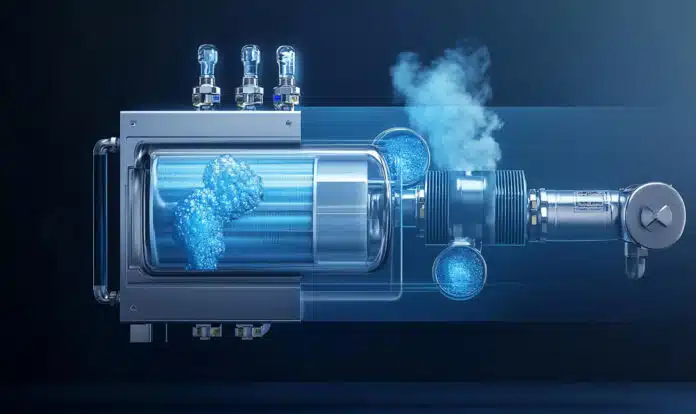
By Ashwini Sakharkar 11 Oct, 2024
Collected at: https://www.techexplorist.com/low-cost-method-reduce-pollution-hydrogen-engines/91075/
Hydrogen-burning internal combustion engines hold immense potential in the battle against climate change. Their remarkable power is coupled with zero emissions of carbon, offering a compelling solution to reducing environmental impact. These engines are well-suited for heavy-duty trucks, buses, off-road and agricultural equipment, as well as backup power generators, providing a cleaner alternative to traditional diesel engines.
However, it’s important to note that they are not without their drawbacks. During the high-temperature combustion process, they emit nitrogen oxides, which can react with other compounds in the atmosphere to form harmful ozone and fine particulate matter. These pollutants can have detrimental effects on our respiratory health and contribute to long-term environmental issues.
UC Riverside scientists have uncovered an innovative, cost-effective method to significantly reduce pollution from hydrogen engines by enhancing the efficiency of their catalytic converters.
The researchers have made a breakthrough by integrating platinum into catalytic converters with a highly porous material known as Y zeolites. This ingenious combination has been found to remarkably boost the reactions between nitrogen oxides and hydrogen, effectively transforming them into harmless nitrogen gas and water vapor.
The study revealed that compared to conventional catalytic converters, the ones infused with zeolites showed a four to fivefold increase in the conversion of nitrogen oxides into benign substances at an engine temperature of 250 degrees Celsius. Notably, this system demonstrated exceptional effectiveness at lower temperatures, thereby playing a pivotal role in curbing pollution during the initial startup of engines when they are still relatively cool.
The innovative technology not only reduces pollution from diesel engines but also offers a promising solution for environmental sustainability. Fudong Liu, the corresponding author and associate professor of chemical and environmental engineering at UCR’s Bourns College of Engineering, explains that the hydrogen injection system can significantly cut down on diesel emissions.
Utilizing zeolites, cost-effective materials with a unique structure, enables a more efficient breakdown of pollutants. The integration of platinum with Y zeolite creates a water-rich environment that enhances hydrogen activation, leading to improved nitrogen reduction efficiency. This breakthrough has the potential to revolutionize the environmental impact of diesel engines and pave the way for cleaner, more sustainable technology.
Shaohua Xie, a research scientist at UCR and lead author of the study, passionately explained how the zeolite enhances the effectiveness of the platinum catalyst by creating a water-rich environment. Liping Liu, a Ph.D. student, and Hongliang Xin, an associate professor at Virginia Tech, further validated this concept through theoretical modeling of the new catalyst system.
“This concept can also apply to other types of zeolites,” Xie added. “It’s a universal strategy,” Liu emphasized that the pollution reduction method is refreshingly simple.
“We don’t need to use complicated chemical or other physical processes,” Liu said. “We just mix the two materials—platinum and zeolite—together, run the reaction, and then we see the improvement in activity and selectivity.”
UCR’s Liu, Xie, and Kailong Ye skillfully blended powders of platinum and Y zeolite before entrusting them to the brilliant scientist Yuejin Li at BASF Environmental Catalyst and Metal Solutions, or ECMS, in Iselin, New Jersey. The resulting potent mixture was transformed into a viscous liquid slurry using cutting-edge binding compounds and meticulously applied to the honeycomb structures inside groundbreaking prototype catalytic converters.
This remarkable endeavor also involved the collaboration of esteemed scientists from the National Synchrotron Light Source II, or NSLS-II, at Brookhaven National Laboratory in Upton, New York.
“Well, we are proud,” Xie said. “We’ve developed a new technology to deal with nitrogen oxide emission control, and we think it’s an amazing technique.”
Journal reference:
- Shaohua Xie, Liping Liu, Yuejin Li, Kailong Ye, Daekun Kim, Xing Zhang, Hongliang Xin, Lu Ma, Steven N. Ehrlich & Fudong Liu. Zeolite-promoted platinum catalyst for efficient reduction of nitrogen oxides with hydrogen. Nature Communications, 2024; DOI: 10.1038/s41467-024-52382-7

Leave a Reply